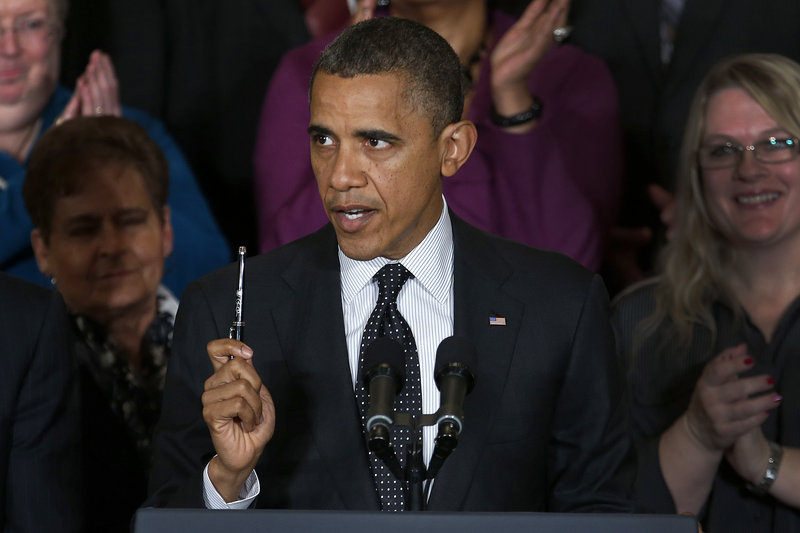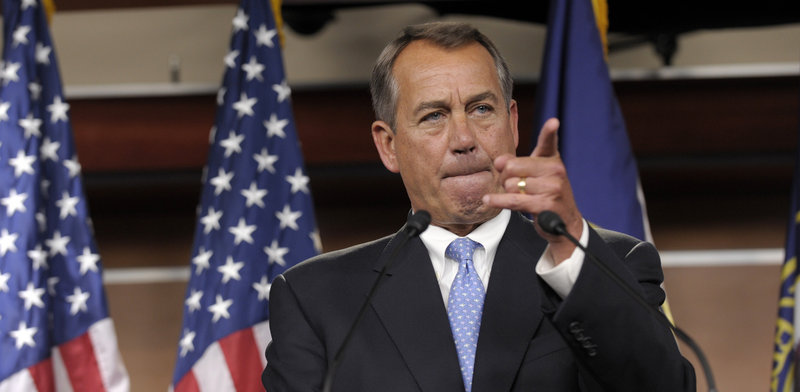WASHINGTON – President Obama called on lawmakers Friday to immediately freeze income tax rates for most Americans while allowing taxes on the wealthy to increase, in his opening bid in the high-stakes struggle with Republicans over the nation’s ballooning debt.
Offering his first public remarks since returning to Washington after his election victory, Obama called senior lawmakers of both parties to the White House next Friday to discuss how to avoid the year-end “fiscal cliff,” the automatic series of tax hikes and spending cuts that economists warn could plunge the nation into recession.
His invitation is the latest in a series of conciliatory moves by leaders of both parties in the immediate aftermath of the election.
“I’m not wedded to every detail of my plan. I’m open to compromise,” Obama told an audience in the East Room of the White House.
“But I refuse to accept any approach that isn’t balanced. I am not going to ask students and seniors and middle-class families to pay down the entire deficit while people like me, making over $250,000, aren’t asked to pay a dime more in taxes.”
While demanding that the wealthy pay more in taxes, Obama did not specifically insist that their income tax rates must rise.
The administration has traditionally said that the George W. Bush tax cuts for the wealthy must expire as scheduled at year’s end, raising rates for upper-income earners to 39.6 percent.
Republicans strongly oppose that position and have said it cannot be part of any deal to avert the fiscal cliff.
It was not clear whether Obama had intended to signal new flexibility over how to tax the wealthy.
But close observers, including top Republicans, quickly said there were potential grounds for compromise if the White House was willing to seek increased revenue from the wealthy without raising rates — for example by cutting deductions and loopholes that disproportionately benefit the wealthy.
Republicans, chastened by their loss in the presidential election, showed a fresh willingness this week to accept a deal that includes new tax revenue as long as it is not generated by higher rates.
After Obama’s remarks, White House press secretary Jay Carney suggested that Obama had given little ground on the issue of raising tax rates for the upper-end taxpayers.
Carney told reporters that the president would veto any legislation that renews Bush-era tax cuts for the wealthy.
In his remarks, Obama said the election results validated his philosophy of making the wealthy pay more.
“This was a central question during the election,” he said. “It was debated over and over again. On Tuesday night, the majority of Americans agreed with my approach.”
Obama’s remarks came amid rising optimism in Washington that the two parties could come together to avoid the fiscal cliff and forge a long-term agreement to tame the national debt.
Both sides are using nuanced language and a conciliatory tone, giving the impression they are flexible without actually making concessions.
The most immediate economic challenge is the year-end fiscal cliff, $500 billion worth of automatic tax increases and government spending cuts. Tax rates would rise for almost all Americans, depriving the average middle-class family of nearly $2,000 in take-home pay next year.
Obama called on Congress to pass legislation right away to stop tax hikes affecting families earning less than $250,000 a year, or 98 percent of Americans.
“It would be bad for the economy and would hit families that are already struggling to make ends meet,” he said. “We shouldn’t need long negotiations and drama to solve that part of the problem.”
Obama and House Speaker John Boehner, R-Ohio, danced around each other Friday.
As he has through the week, Boehner showed an openness to increasing tax revenues as part of a deal to tame the debt, though he ruled out raising rates.
“Increased tax rates will destroy jobs in America by hurting small businesses across the country,” he said Friday after Obama spoke.
Boehner said he could support increased tax revenue through tax reform that eliminates loopholes and deductions.
Wealthy Americans, for example, dramatically reduce their tax burdens by paying preferential rates for investment income and taking big deductions on charitable contributions and mortgage interest payments.
Obama has been largely out of the limelight since his victory speech late Tuesday night — although a video of him tearing up while thanking his campaign staff in Chicago circulated widely online Thursday.
He appeared Friday with Vice President Joe Biden, making a crisp seven-minute statement before a throng of White House staff and supporters.
In the East Room, Obama made clear that if Republicans don’t go along with his plan for compromise, he would bring his argument to the American people, surrounding himself with a diverse group of supporters and echoing the themes of his campaign: fixing the country’s budget problems while putting people back to work.
But Obama won’t be on a campaign trail as he begins the negotiations.
Instead he will return to the behind-closed-doors talks that nearly led to a “grand bargain” in the summer of 2011.
Those sessions, between Obama and Boehner, produced great optimism before they broke down over tax policy, sparking furious critiques from both sides.
Obama did not produce a new plan to tame the debt Friday, but he has in the past called for a mix of tax hikes, spending cuts and modest changes to entitlements.
President George W. Bush dramatically lowered tax rates for most Americans during his first term, but those provisions expired in 2010.
Obama renewed them amid a weak economy, but he has since vowed to allow the rates for the wealthy to expire at the end of this year.
The Congressional Budget Office, Congress’s nonpartisan arbiter, said Thursday that allowing the upper-income tax cuts to expire would do the least harm to the economy of any component of the fiscal cliff.
The CBO said that allowing tax cuts for all earners to lapse would cost about 1.8 million jobs next year, while allowing tax cuts for just upper-income earners would cost just 200,000 jobs.
The upper-income tax cuts would cost the government about $800 billion in revenue over the next decade.
The upper-income tax cuts cover the top 2 percent of earners.
According to voter exit polls conducted Tuesday, 47 percent of voters surveyed favored raising taxes on incomes of $250,000 and up, as Obama proposes, and an additional 13 percent supported raising taxes on everyone.
Only 35 percent opposed any tax increases at all.
Send questions/comments to the editors.




Success. Please wait for the page to reload. If the page does not reload within 5 seconds, please refresh the page.
Enter your email and password to access comments.
Hi, to comment on stories you must . This profile is in addition to your subscription and website login.
Already have a commenting profile? .
Invalid username/password.
Please check your email to confirm and complete your registration.
Only subscribers are eligible to post comments. Please subscribe or login first for digital access. Here’s why.
Use the form below to reset your password. When you've submitted your account email, we will send an email with a reset code.